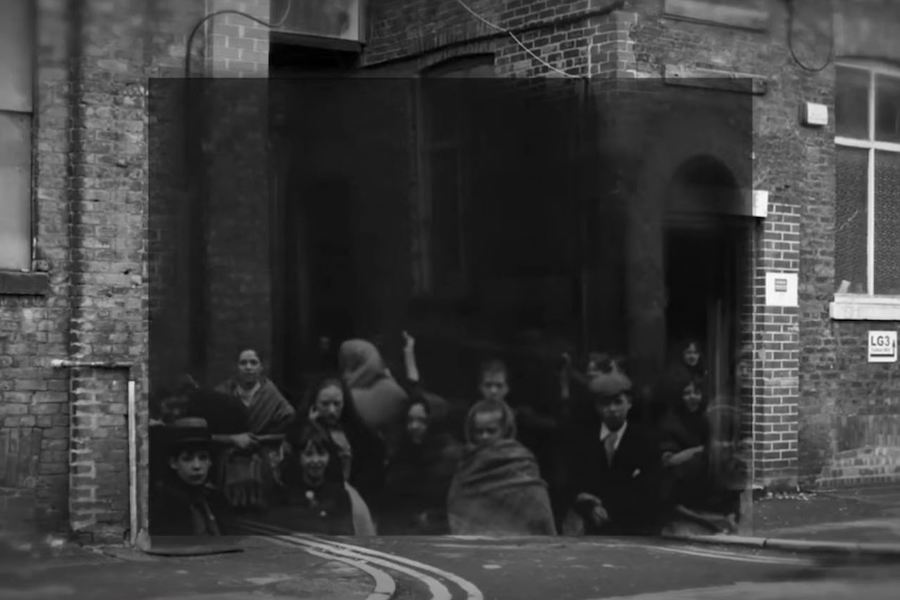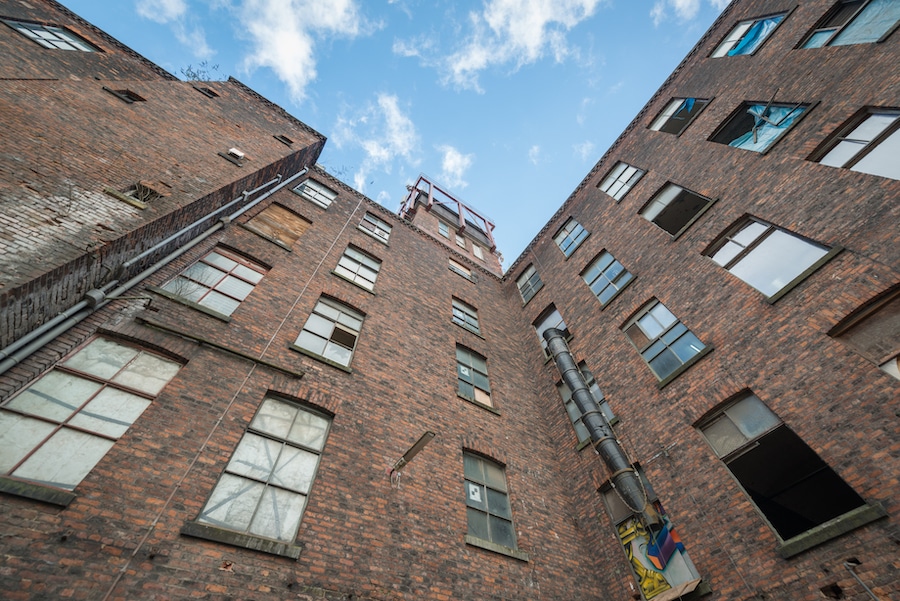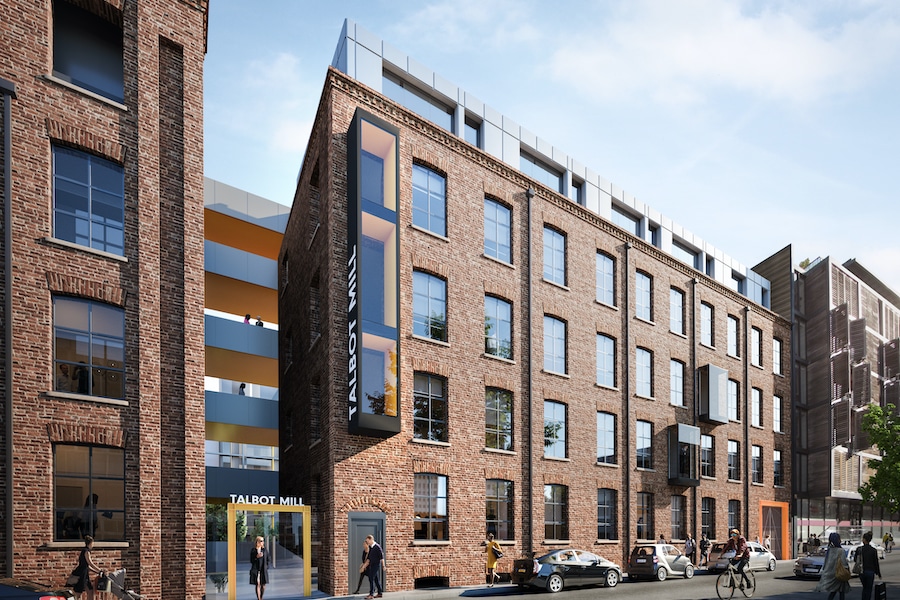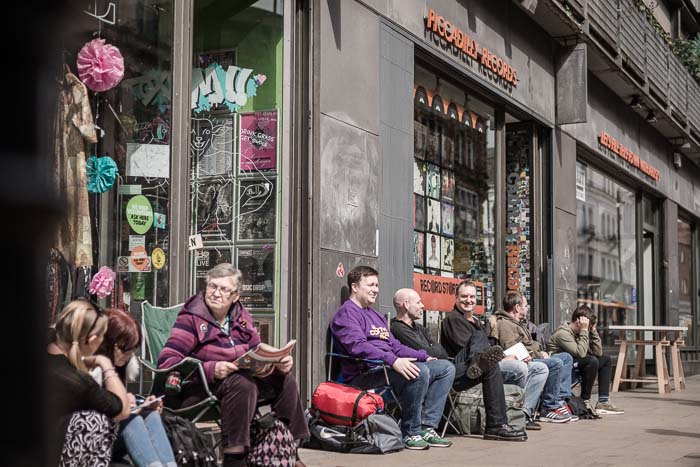Historic mill formerly at the ‘heart of Cottonopolis’ to receive a £38m redevelopment
- Written by Ethan Davies
- Last updated 10 months ago
- City of Manchester, Property & Planning

When workers finishing their day of work at Talbot Mill streamed out at closing time in 1900, some were surprised to see the presence of a film camera.
But more would be surprised that the cotton mill in the heart of Manchester’s Cottonopolis would shut down within decades of that video being captured.
The video taken in 1900 showed Talbot Mill at the peak of its powers.
By 1930 it had closed.
Talbot Mill redevelopment
Originally built by J&E Waters in 1855, the company merged in 1897 with rivals to become a key part of the English Sewing Cotton Company. Just three years later, the footage was captured by A.D. Thomas when the city’s industrial might was powerful.
Thomas’ film was not for documentary or artistic purposes, though. He was part of a trend started by Sagar Mitchell and James Kenyon, who founded their company in 1897 in Blackburn.
They would film workers leaving at the end of the day or at lunchtime, positioning themselves by the gates so they could capture the maximum number of people on camera. They would then hand out leaflets telling workers where the film would be screened.
That was all done so people could view the film later — and see themselves on-camera for the first time — which was a booming trade at the turn of the 20th century.
In Talbot Mill’s case, the negatives were found inside a barrel in Blackburn in 1994 by Peter Worden, a local film enthusiast, and in 2000 the British Film Institute took ownership and restored the vast number of negatives to 800 working films.
By the time of Worden’s discovery, though, Talbot Mill had been left empty. Indeed, just thirty years on from the day the film he saved was captured, the cotton operation came to a halt.
Manchester mushroom farm
The sewing stopped, but business on the site did not.
Small firms moved in for the next fifty years, before a mushroom farm took over in the 80s, when Manchester was firmly in post-industrial decline.
It then lay largely abandoned, falling into dereliction, only being used for period drama filming. But now, more than thirty years after it was last used day-to-day, Talbot Mill is set to be reborn.
£38m Capital&Centric redevelopment

Developers Capital&Centric are hoping to breathe new life into the Ellesmere Street landmark in Castlefield, with a £38 million project, starting up this week.
It will see the original L-shaped mill converted into apartments, and a new 10-storey tower built on the site next to an arm of the Bridgewater Canal. In all, 190 new flats will be built, which will surround a new courtyard garden at the heart of the development.

“Talbot is steeped in history, it spearheaded the rapid transformation of that part of the city and stands as a reminder of Manchester’s industrial past,” said John Moffat, joint managing director at Capital&Centric.
“We’re now on with the meticulous restoration and repurposing of the mill, keeping as many of the original features as we can.
“When done, people will be calling an important piece of the city’s heritage their home – with all the historical charm, but a modern, design edge.”
You can find out more about Talbot Mill by clicking here
- This article was last updated 10 months ago.
- It was first published on 10 June 2024 and is subject to be updated from time to time. Please refresh or return to see the latest version.
Did we miss something? Let us know: press@ilovemanchester.com
Want to be the first to receive all the latest news stories, what’s on and events from the heart of Manchester? Sign up here.
Manchester is a successful city, but many people suffer. I Love Manchester helps raise awareness and funds to help improve the lives and prospects of people across Greater Manchester – and we can’t do it without your help. So please support us with what you can so we can continue to spread the love. Thank you in advance!
An email you’ll love. Subscribe to our newsletter to get the latest news stories delivered direct to your inbox.
Got a story worth sharing?
What’s the story? We are all ears when it comes to positive news and inspiring stories. You can send story ideas to press@ilovemanchester.com
While we can’t guarantee to publish everything, we will always consider any enquiry or idea that promotes:
- Independent new openings
- Human interest
- Not-for-profit organisations
- Community Interest Companies (CiCs) and projects
- Charities and charitable initiatives
- Affordability and offers saving people over 20%
For anything else, don’t hesitate to get in touch with us about advertorials (from £350+VAT) and advertising opportunities: advertise@ilovemanchester.com


Review: The Koala Who Could at LOWRY is ‘an uplifting journey of courage and change’


















